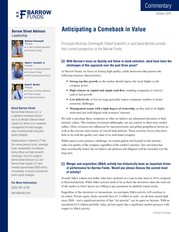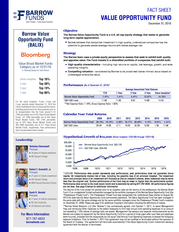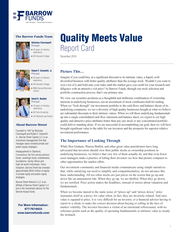Description
BARROW
FUNDS
Value Principles
ï¬
Insights
Private Equity Perspective
Many all cap managers minimize their percentage
holdings in the small cap bucket and have a large/
mid cap bias. Would you please discuss your portfolio
composition from a market cap perspective and the
expected risk/reward of each capitalization range?
We generally weight our Portfolio equally across all
three market cap categories. We do this for a variety
of reasons, not the least of which is that the quality and
value attributes we use to select stocks have historically
generated alpha in all three categories. We are not afraid
to weight one-third of the Portfolio in smaller companies.
We want our investors to have the best opportunities for
returns across all capitalization ranges.
Your portfolio composition emphasizes six sectors that
are common across market caps.
What led you to focus on only these sectors? We analyze companies based chiefly on audited financials. We feel it’s an approach that is designed to take out the risks of making erroneous forecasts and emphasize proven operating results instead. There are certain sectors that lend themselves better than others to this framework.
For example, technology and telecom are currently excluded from our covered sectors because their valuations typically rely heavily on forward-looking predictions that we think are generally unreliable. With regard to utilities, since they do not rank attractively, we have historically made the decision to exclude the sector entirely. Financials have not been part of our Portfolio because even looking at audited balance sheets often does not allow the reader to assess stress risks to the franchise deriving from derivatives and off-balance sheet liabilities. Would you please discuss your risk mitigation philosophy within the Long/Short Portfolio? If we can deliver on our long-term goal of capital appreciation while also attempting to reduce volatility and preserve capital during market downtowns, our long/ short strategy may be a good alternative in model portfolios for investors who have concerns about what may be high risk and limited reward in other asset classes. What are your thoughts with respect to your short positions? Over time, we believe that companies with high-quality balance sheets and operating fundamentals that trade at significant discounts to our view of their intrinsic values should outperform companies we consider to have low-quality balance sheets and operating fundamentals that trade at premiums to our view of their intrinsic value. Our short book consists of a diversified collection of this latter group—companies we consider to have poor quality and value attributes.
To achieve diversification, we spread these shorts across many names, multiple industry sectors, and all three market cap categories. Please discuss the factors that drive your target net long exposure. What is generally the operating range for the net long exposure? In the Barrow All-Cap Core Fund, we are essentially fully-invested. We do not try to time the market or use cash defensively.
In the Barrow All-Cap Long/Short Fund, we generally run the Fund such that it will maintain gross exposure to the equity market to allow investors a meaningful opportunity to participate in Barrow’s alpha generation. Our short book is designed to provide a hedge against market downturns. We like maintaining consistent exposures to avoid emotional responses to market volatility. We believe that owning a diverse group of companies that trade at a deep discount to their intrinsic value is the most effective form of long-term risk mitigation.
Over the short term, we seek to partially insulate our Portfolio from broader market fluctuations by building a carefully selected, diversified short book of companies with poor quality and value metrics. We balance these selections by the market cap and sector weighting of our long holdings to avoid inadvertent sector or market cap bets. Disclosure Mutual fund investing involves risk. Principal loss is possible.
The Fund’s investment objectives, risks, charges and expenses must be considered carefully before investing. The prospectus contains this and other important information about the Fund and may be obtained by calling 1-877-767-6633. Read it carefully before investing. † Margin of Safety: Benjamin Graham, considered to be the father of value investing philosophy, wrote “the ‘margin of safety’ resides in the discount at which the stock is selling below its minimum intrinsic value, as measured by the analyst.” Graham, B.
and Dodd, D. (1951) Security Analysis. New York, NY: McGraw-Hill. .
What led you to focus on only these sectors? We analyze companies based chiefly on audited financials. We feel it’s an approach that is designed to take out the risks of making erroneous forecasts and emphasize proven operating results instead. There are certain sectors that lend themselves better than others to this framework.
For example, technology and telecom are currently excluded from our covered sectors because their valuations typically rely heavily on forward-looking predictions that we think are generally unreliable. With regard to utilities, since they do not rank attractively, we have historically made the decision to exclude the sector entirely. Financials have not been part of our Portfolio because even looking at audited balance sheets often does not allow the reader to assess stress risks to the franchise deriving from derivatives and off-balance sheet liabilities. Would you please discuss your risk mitigation philosophy within the Long/Short Portfolio? If we can deliver on our long-term goal of capital appreciation while also attempting to reduce volatility and preserve capital during market downtowns, our long/ short strategy may be a good alternative in model portfolios for investors who have concerns about what may be high risk and limited reward in other asset classes. What are your thoughts with respect to your short positions? Over time, we believe that companies with high-quality balance sheets and operating fundamentals that trade at significant discounts to our view of their intrinsic values should outperform companies we consider to have low-quality balance sheets and operating fundamentals that trade at premiums to our view of their intrinsic value. Our short book consists of a diversified collection of this latter group—companies we consider to have poor quality and value attributes.
To achieve diversification, we spread these shorts across many names, multiple industry sectors, and all three market cap categories. Please discuss the factors that drive your target net long exposure. What is generally the operating range for the net long exposure? In the Barrow All-Cap Core Fund, we are essentially fully-invested. We do not try to time the market or use cash defensively.
In the Barrow All-Cap Long/Short Fund, we generally run the Fund such that it will maintain gross exposure to the equity market to allow investors a meaningful opportunity to participate in Barrow’s alpha generation. Our short book is designed to provide a hedge against market downturns. We like maintaining consistent exposures to avoid emotional responses to market volatility. We believe that owning a diverse group of companies that trade at a deep discount to their intrinsic value is the most effective form of long-term risk mitigation.
Over the short term, we seek to partially insulate our Portfolio from broader market fluctuations by building a carefully selected, diversified short book of companies with poor quality and value metrics. We balance these selections by the market cap and sector weighting of our long holdings to avoid inadvertent sector or market cap bets. Disclosure Mutual fund investing involves risk. Principal loss is possible.
The Fund’s investment objectives, risks, charges and expenses must be considered carefully before investing. The prospectus contains this and other important information about the Fund and may be obtained by calling 1-877-767-6633. Read it carefully before investing. † Margin of Safety: Benjamin Graham, considered to be the father of value investing philosophy, wrote “the ‘margin of safety’ resides in the discount at which the stock is selling below its minimum intrinsic value, as measured by the analyst.” Graham, B.
and Dodd, D. (1951) Security Analysis. New York, NY: McGraw-Hill. .













